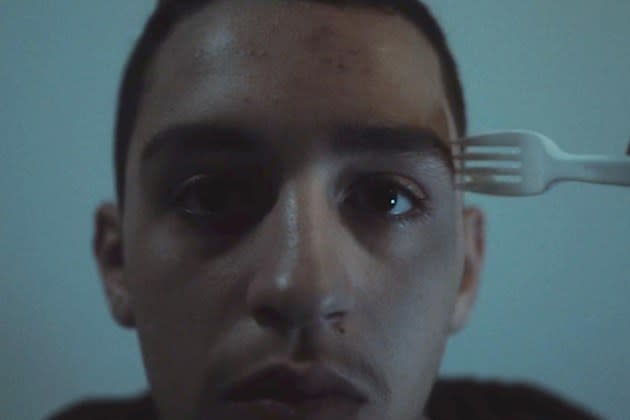‘Xoftex’ Review: Noaz Deshe’s Delirious Refugee Story Captures The Eternal Disorientation Of The Stateless Mind – Karlovy Vary

It wouldn’t be a film festival without at least one timely, harrowing emigrant story, but just when you might think the stylistic possibilities have been exhausted — from documentary, to vérité-style fiction and occasionally a dash of deadpan comedy (like Ben Sharrock’s wonderful Limbo, 2020) — along comes Noaz Deshe’s audacious, delirious feature Xoftex. Perhaps too out-there in its concepts and execution for mainstream crossover, Deshe’s film should pick up steam on the arthouse circuit, offering an unorthodox, often oblique, but emotionally powerful attempt to recreate onscreen the disorientation of the stateless mind.
The title, which sounds like something Big Pharma might produce, is actually an immigrant compound in Greece, where largely Muslim refugees are housed while they await the outcome of their asylum claims. This, a brusque opening credit tells us, can take up to a year, but the truth is that the process can go on much, much longer. To pass the time, a group of men, led by Nasser (Abdulrahman Diab) and his older brother Yassin (Osama Hafiry), both fleeing the Syrian war, make movies on Nasser’s phone, acting out stories from their direct experience, anticipating the possibility of forced repatriation, even going so far as to make a funny, surreal comment on war reportage in a spoof interview with a bomb.
More from Deadline
The camp is a vast white enclave of prefab boxes more befitting of an industrial estate than a suburb, which is what it effectively is, and its inhabitants talk excitedly, even romantically, about being anywhere but there. One man dreams of Paris, another directs him to Poland. Another points out the potentially dangerous right-wing political feeling that is growing in both those places (“You think Europe means human rights,” he says, in the most cutting line in the entire movie). Nasser’s brother just seems to be happy to tag along with his brother, who has his sights set on Sweden. There, Nasser will pursue his dreams of becoming a scientist, in the perhaps naïve hope that he will be able to invent something so extraordinary that will change the world for people like him forever.
For the first hour or so, Deshe’s film focuses on the mental torture of staying put: living in a twilight zone that comes to resemble a dystopian sci-fi movie (there are hints of Tarkovsky’s Stalker). It also briefly digresses into the brutal factuality of leaving, introducing us to the people smuggler who, for a fee, will stow escapees on trains bound for the Balkans, offering them tips on how to avoid being maimed by flying stones and repel the attentions of border-control sniffer dogs.
Nasser decides to stay, believing in the system, but when his application is turned down (or has it just been ignored again?), the futility of his nowhere life starts to eat away at him. Time is really not a measurable commodity in this world. “How long have you been here?” he asks the other members of the drama group. No one can remember, which inspires him to make their next production: a zombie flick.
These metatextual layers — fictions within fictions — are deliberate and not to be underestimated, since, in his online science classes, Nasser hears a lot about something called “the Casimir effect”, an unexplained energy — “It shouldn’t exist, but it does” — that exists in a vacuum between two facing mirrors.
Mirrors are a major metaphor in Deshe’s film (one of Nasser’s longer gestating projects is an abstract artwork made of broken mirror shards, and he is fascinated when one of his neighbors decorates his prefab home with a disco mirror ball). Yet there is a greater sense that Nasser is trapped by the vast, Orphée-style liquid mirror that is the ocean; having made a perilous sea-crossing in an inflatable boat, his dreams (and nightmares) all have a surreal, submerged quality, suggesting that part (or all?) of him never made it to Greece in the first place.
That’s quite enough to be going on with, but Xoftex takes a quantum leap into mannered strangeness with a lyrical but frustrating 20-minute coda that recalls the Greek “weird wave”. On that basis, it’s a shame that Deshe’s film isn’t just a little more user-friendly, but to play devil’s advocate, his use of teasing, unapologetically inscrutable esoterica — which is present all through the film, notably in a subplot involving “sleepers” who never seem to wake up from their traumatic journeys — gives the film its hypnotic power.
Not everyone will succumb to it, but for those that do, Xoftex is an immersive fever dream about the reality of forced statelessness: an eternal, numbing now where the dazzling possibilities of tomorrow dangle, unobtainable, in plain view. Fittingly, for the setting, very much like the punishments of Greek mythology.
Best of Deadline
Broadway Spring 2024: Sufjan Stevens ‘Illinoise’ & All Of Deadline’s Reviews
Berlin Film Festival 2024: Award Ceremony, Film Premieres & Red Carpet Gallery
Sundance Film Festival 2024 Photos: Award Ceremony, Film Premieres & Parties Gallery
Sign up for Deadline's Newsletter. For the latest news, follow us on Facebook, Twitter, and Instagram.

 Yahoo News
Yahoo News 